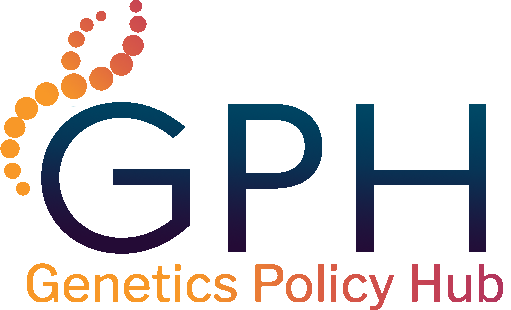From 2004 to 2024, the Health Resources and Services Administration (HRSA) funded the National Coordinating Center for the Regional Genetics Networks (NCC). NCC developed and maintained the Genetics Policy Hub.
With the conclusion of NCC funding, the Genetics Policy Hub (GPH) will no longer be updated or maintained. Information on GPH should be used for historical reference only.
Utah
This data is meant to be used for educational purposes to inform providers, patients, insurers, and state Medicaid agencies what genetic services may or may not be written into each state’s Medicaid policy. The database is not meant to indicate or imply whether a certain program will cover a specific service, since many decisions are made on a case by case basis. If you have specific questions about whether a service is covered, you should reach out to your plan administrator. Please see this disclaimer below for more information.
Medicaid Coverage Information Published
State Contact Information
Jennifer Strohecker
Director, Division of Medicaid and Health Financing
Utah Department of Health
PO Box 143101
Salt Lake City, UT 84114
Phone: (801) 538-6689
MAIL:
Utah Department of Health and Human Services
Division of Integrated Healthcare
P.O. Box 143106
Salt Lake City, UT 84114-3106
https://medicaid.utah.gov/contact/
https://medicaiddirectors.org/wp-content/uploads/2023/06/Public_DirectorsList_June2023-1.pdf
General Genetic Testing Criteria
The following criteria apply if there are no specific criteria for testing in Medicaid’s evidencebased criteria tool. If criteria do exist, then the requirements for medical necessity will supersede the criteria in this policy. For the specific categories of testing where standards do not exist, the following criteria must be met:
Testing of an affected (symptomatic) individual’s germline DNA to benefit the member (excluding reproductive testing)
- Diagnostic
- An association of the marker with the disorder has been established, and
- Symptoms of the disease are present, and
- A definitive diagnosis cannot be made based on history, physical examination, pedigree analysis, standard diagnostic studies/tests, and
- The clinical efficacy of identifying the mutation has been established:
- leading to changes in the clinical management of the condition, which improve clinical outcomes, or
- Eliminates the need for further diagnostics or other invasive testing, or
- this leads to the discontinuation of interventions that are unnecessary or ineffective.
- Prognostic
- An association of the marker with the natural history of the disease has been established, and
- Clinical efficacy of identifying the mutation has been established:
- Provides incremental prognostic information above that of standardized testing, and
- Reclassifies patients into clinically relevant prognostic categories for which there are different treatment strategies, and
- Reclassification leads to changes in medical management that improve clinical outcomes
- Therapeutic
- Genetic testing identifies variants of a phenotype/metabolic state that relate to different pharmacokinetics, drug efficacy or adverse drug reactions, and
- Clinical efficacy of identifying the mutation has been established and leads to:
- the initiation of effective treatment,
- the discontinuation of treatments that are ineffective or harmful, or
- a change in medication that is likely to improve outcomes.
Genetic Testing Not Covered
Experimental or investigational (excluding members who are participating in qualifying clinical trials for the prevention, detection, or treatment of any serious or lifethreatening disease or condition as outlined in Section 210 of the “Consolidated Appropriations Act, 2021”)
Tests for screening purposes only (excluding newborn screening as defined in Utah Administrative Code R398-2. Newborn Hearing Screening), including:
- preimplantation genetic diagnosis (PGD),
- prenatal genetic screening, or
- in the absence of signs or symptoms
Tests, for the member or family members, performed solely for genetic counseling, family planning,
Tests for research to find a rare or new gene not previously identified or of unclear clinical significance
Direct-to-consumer (DTC) genetic tests
Tests of a member’s germline DNA to benefit family member(s) rather than to benefit the member
Establishment of paternity
Genetic testing is not medically necessary when performed entirely for non-medical reasons (e.g., a general interest in genetic test results)
Cytogenetics studies are not covered services, Tier 2 Molecular Pathology procedures are not covered services.
State Specific Definition
Genetic testing involves the analysis of chromosomes, DNA (deoxyribonucleic acid), RNA (ribonucleic acid), genes, or gene products to detect inherited (germline) or noninherited (somatic) genetic variants related to disease or health.
Genetic Services for Children
Genetic testing is medically necessary for EPSDT eligible members when there is a reasonable expectation based on family history, risk factors, or symptomatology that a genetically inherite condition exists, and any of the following clinical scenarios also exist:
- Clinical presentation fits a well-defined syndrome for which a specific or targeted gene test is available, or
- A definitive diagnosis cannot be made based on history, physical examination, pedigree analysis, or standard diagnostic studies or tests, or
- There is a clinical syndrome with a broad number of potential diagnoses, and without a specific diagnosis, the medical management will include unnecessary monitoring, testing, hospitalizations, or medical setbacks, or
- There is a clinical syndrome with a broad number of potential diagnoses, and a specific diagnosis will determine prognosis and appropriate medical management
Genetic Counseling Requirement
The following requirements must be met:
Official transcript documenting a Master’s or Doctoral degree in genetic counseling from an approved program. Note: Transcripts are considered “official” when they are sent directly from the school to DOPL or sealed in an envelope bearing the school’s stamp/seal on the envelope flap.
Documentation of one of the following certifications:
- Genetic Counselor by the American Board of Genetic Counseling
- Genetic Counselor by the American Board of Medical Genetics
- Medical Geneticist by the American Board of Medical Genetics
Genetic testing must be medically necessary and ordered by a Medicaid enrolled provider acting within the scope of their practice. Providers must be able to counsel clients on the particular genetic test ordered and the results of the test, as it applies to the member, in consultation with a genetic specialist as needed. If a Provider is unable to counsel a member regarding genetic testing, they must refer the member to a provider capable of providing genetic counseling before ordering the test.
Metabolic Formula Coverage Legislation
Utah Code §31A‐ 22‐623
UAC R590‐194
Metabolic Formula Coverage & Criteria
Enteral formula and medical foods for the treatment of inborn errors of metabolism are covered services. Both services are covered for members under one year of age. Reporting of these services is limited to the following:
- Members 21 years or older should report the following code regardless of delivery method.
- B4157 – Enteral formula, nutritionally complete, for special metabolic needs for inherited
disease of metabolism, includes proteins, fats, carbohydrates, vitamins and minerals, may
include fiber, administered through an enteral feeding tube, 100 calories = 1 unit
- B4157 – Enteral formula, nutritionally complete, for special metabolic needs for inherited
- EPSDT members receiving enteral formula or medical foods for the treatment of inborn errors of metabolism are reported with the following:
- B4162 – Enteral formula, for pediatrics, special metabolic needs for inherited disease of
metabolism, includes proteins, fats, carbohydrates, vitamins and minerals, may include
fiber, administered through an enteral feeding tube, 100 calories = 1 unit - S9435- Medical foods for inborn errors of metabolism.
- B4162 – Enteral formula, for pediatrics, special metabolic needs for inherited disease of
Prior Authorization Requirements
Genetic testing may require Prior Authorization (PA). Specific coverage on CPT or HCPCS codes is found in the Utah Medicaid Coverage and Reimbursement Code Lookup. Coverage of genetic testing by Medicaid is determined by using evidence-based criteria and may require review by a Medicaid Consultant.
Prior Authorization Forms
Fee Schedule
BRCA Testing Coverage
Yes
Requirements for BRCA
BRCA1/BRCA2 are covered when the client meets criteria for the covered codes and a screening panel customized to follow panels completed on other family members is advised. For reimbursement of the
service, submit documentation for medical review and approval of the testing prior to testing.
Documentation must meet either of the following two requirements:
A client affected with one of the following:
Women affected with breast cancer, ovarian cancer, cancer of the fallopian tube, or primary
peritoneal cancer, and are from families with a high risk of BRCA1 or BRCA2 mutation as
defined in the policy guidelines.
Women who at 50 years of age or less (regardless of family history), are affected with one of the
following:
-
- Early onset breast or ovarian cancer
- Multiple primary breast or ovarian cancers
- bilateral breast, ovarian, or fallopian tube cancers
- breast with ovarian cancer, fallopian tube cancer, or primary peritoneal cancer
Men affected with breast cancer at any age.
An unaffected adult may be considered under one of the following circumstances:
Unaffected individuals (male or female) from families with a known BRCA1 or BRCA2 mutation
Unaffected individuals from families with a high risk of BRCA1 or BRCA2 mutation based on a
family history where it is not possible to test an affected family member for a mutation
Unaffected individuals in populations at risk for specific founder mutations due to ethnic
background (e.g., Ashkenazi Jewish descent, Norwegians, Dutch, and Icelanders with one or more
relatives with breast or ovarian cancer at any age)
Cystic Fibrosis Screening
Coverage is available.
Hereditary Cancer Testing Coverage
Yes, hereditary cancer testing is covered. See BRCA Testing Coverage and Lynch Syndrome Testing Coverage for more information about hereditary testing criteria.
Lynch Syndrome Testing Coverage
Prior to testing for colon cancer, submit supportive documentation for approval of the appropriate Medicaid covered code. Less than 3% of colon cancers are linked as hereditary. Testing may be supported under one
of the following conditions:
- Results from code 81301, microsatellite instability analysis, support the need for further testing, because the result may affect treatment.
- Genetic testing may be considered when there are family members with Lynch Syndrome (data suggests that there is a 50% risk of Lynch Syndrome when a first-degree relative has the disease).
- Testing for hereditary non-polyposis colon cancer requires at least three family members with a history of this, one of which must be a first-degree relative.
- The molecular pathology codes include all analytical services performed in the test (e.g., cell lysis, nucleic acid stabilization, extraction, digestion, amplification, and detection). Any procedures required prior to cell lysis (e.g., microdissection,) is reported separately.
- All analyses are qualitative unless otherwise noted
- Microbial identification
- In situ hybridization analyses
Microarray Testing
Genome-wide microarray analysis for copy number and loss-of-heterozygosity variants is covered.
Newborn Screening
Yes, newborn screening is covered.
Panel Testing
HCPCS code S3854, gene expression profile panel for use in management of breast cancer treatment, is used for Oncotype DX testing. Oncotype DX testing in women and men with breast cancer is to establish recurrence risk to determine if adjuvant chemotherapy would be beneficial. Current guidelines consider medical necessity to include newly diagnosed patients whose breast cancer is stage I or II, node-negative, and estrogen receptor positive. For reimbursement of the service, prior to testing, submit documentation for medical review and approval.
Panel tests must be performed prior to whole exome sequencing.
Pharmacogenetic Testing
Genetic testing that identifies variants of a phenotype/metabolic state that relate to different pharmacokinetics, drug efficacy or adverse drug reactions, and clinical efficacy of identifying the mutation has been established and leads to: a) the initiation of effective treatment, b) the discontinuation of treatments that are ineffective or harmful, or c) a change in medication that is likely to improve outcomes is covered.
Prenatal Testing Offered
No coverage offered.
Whole Exome Sequencing
Identifying a molecularly confirmed diagnosis promptly for an individual with a rare genetic condition can have a variety of health outcomes, including:
- Guiding prognosis and improving clinical decision-making that can improve clinical outcome by application of specific treatments as well as withholding of contraindicated treatments for certain rare genetic conditions
- Surveillance for later-onset comorbidities
- Reducing the financial and psychological impact of diagnostic uncertainty, eliminating lower-yield testing, and additional screening(s) that may later be proven unnecessary once a diagnosis is achieved
- WES is considered medically necessary for the evaluation of unexplained congenital or neurodevelopmental disorders in EPSDT eligible members when all of the following criteria are met:
- After all other appropriate diagnostic testing has been performed, and the member remains undiagnosed (e.g., targeted single-gene testing, panel testing, MRI, etc.), and
- Results of such testing are expected to influence medical management and clinical outcomes directly.
Other Tests Covered
Other Information
Where criteria do not exist, the PA requester must submit publicly accessible data from peerreviewed scientific literature or the national databases that address the clinical validity, predictive
value, or medical benefits of the genetic test.
Resources
Newborn Screening Reimbursement

Disclaimer: The information contained in the database has been obtained from sources believed to be reliable but NCC has not attempted to validate or confirm the information. The database may be updated periodically. However, the accuracy and completeness of the information contained in the database cannot be, and is not, guaranteed. NCC makes no warranty of the accuracy, completeness or timeliness of this information, and shall not be liable for any decision made in reliance on this information. It is the user’s responsibility to verify this information by contacting the state Medicaid agency directly.
The database contains links to third-party websites. These links are provided solely as a convenience to users and not as a guarantee, warrantee, or recommendation by NCC of the content on such third-party websites or as an indication of any affiliation, sponsorship or endorsement of such third party websites. NCC is not responsible for the content of linked third-party sites and does not make any representations regarding the privacy practices of, or the content or accuracy of materials on, such third-party websites. If you decide to access linked third-party websites, you do so at your own risk. Your use of third-party websites is subject to the terms of use for such sites.

